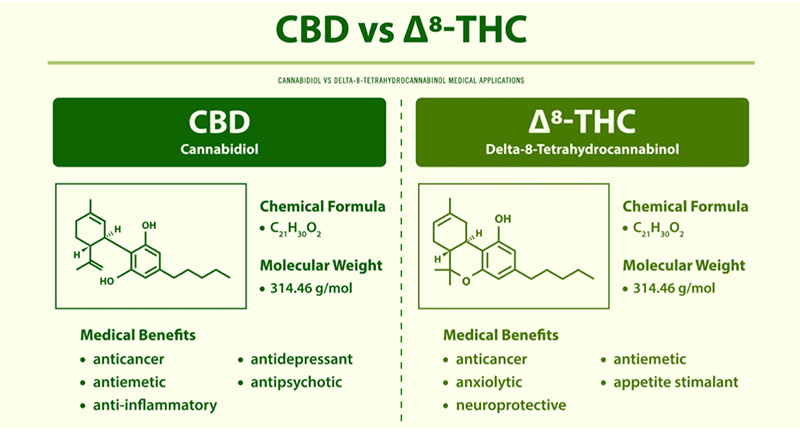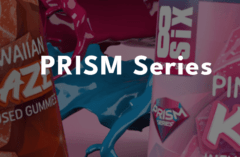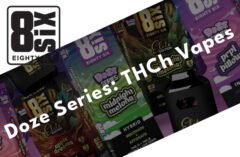Table of Contents [show]
Do you have arthritis or another form of severe pain? You may be undecided about whether to take delta 8 THC or CBD. These two compounds are obtained from cannabis plants but have varying components.
Recent research indicates that delta 8 might be better compared to CBD when dealing with pain. One of the leading products of consumption in the current hemp market are delta 8 gummies, effective in treating chronic pain, anxiety, fatigue, and insomnia.
According to the study, more patients use CBD or cannabis for medical purposes. Meanwhile many of the consumers opting to take Delta 8 are enjoying the substance for recreational purposes.
Despite not being intoxicating, CBD is relieving many symptoms for people suffering from pain and nervous system issues. The two compounds have different pain-relieving properties. Here are the main differences between THC and CBD for reducing pain.

Delta 8 Vs. CBD Explained
| Delta 8 THC | CBD | |
| Psychoactive | Yes | No |
| Endocannabinoid system (ECS) | CB1 and CB2 receptor agonist | The modulator of the ECS and FAAH inhibitor |
| Does it test positive for THC? | Yes | No |
| Most common health benefits | Anti-nausea, appetite stimulant, analgesic, anti-anxiety, anti-inflammatory | Anti-stress, anti-convulsant, muscle relaxant, anti-nausea, sleep regulation, anti-anxiety, analgesic |
| Side Effects | Dry mouth, red eyes, confusion, fatigue, sedation | Dry mouth, changes in appetite, irritation, dizziness |
| Price | $$–$$$ | $$–$$$ |
In addition to their differences in cognitive effects, delta-8 THC and CBD have a more substantial impact on perception and cognition. Compared to delta 9 THC, this high will induce a similar high, but without causing paranoia and anxiety in sensitive people.
Delta 8 THC and CBD are both classified as “psychoactive” by textbooks.
Any substance or activity affects mood, perception, and emotion.
In fact, delta 8 THC and CBD are both psychoactive because both affect our emotions and emotions affect our moods. However, delta-8 THC produces more profound cognitive changes which make you feel “high” whereas CBD does not.
What is CBD?
CBD (cannabidiol) is derived from hemp or cannabis plants. Cannabis and hemp originate from the Cannabis sativa plant. Recommended hemp has 0.3% traces of THC from trusted sources. CBD is available in the form of gummies, extracts, supplements, oils, and gels. CBD is known to treat different conditions, such as:
- Seizures
- Chronic pains
- Inflammation
- Schizophrenia
- Mental disorders
- Nausea
- Sleep disorders
- Depression
- Migraine
- Anxiety
What is Delta 8 THC?
THC (tetrahydrocannabinol) is a popular psychoactive element in cannabis plants associated with the production of high sensations. The high feeling can make the consumer happy, euphoric, or even hungry. Roger Adams discovered THC in 1940. Currently, most cannabis plants contain about 10–20% THC traces. THC is taken in through smoking cannabis or in the form of capsules, oils, edibles, and tinctures.
When people talk about THC, they usually refer to delta-9 THC, which is what creates a “high.” Delta-8 THC has some similarities to delta-9 THC.
The delta-8 THC has a slightly different chemical structure from the delta-9 THC, which explains its reduced potency.
Delta 8 THC has shown to be beneficial with conditions such as:
- Insomnia
- Pain
- Muscle spasticity
- Anxiety
- Low appetite
- Glaucoma
- Nausea
The relief may be a result of the high resulting from the THC.
How CBD and Delta 8 Provide Pain Relief
Studies show that CBD and THC trigger diverse cannabinoid receptors, stimulating the brain compounds and producing particular effects.THC activates the cannabinoid receptors, such as nerve and immune cells, which later relieve any chronic body pain. CBD interferes with serotonin and glycine receptors involved in pain relief. Much evidence has not been revealed for mental pain relief on how CBD can be effective.
How CBD and Delta 8 Can Help with Anxiety
CBD helps in relieving anxiety. Anxiety comes with other comorbidities, such as stress and depression, which may leave the patient in chronic pain. Taking cannabidiol may be a suitable mechanism for reducing these different issues as it reduces severe pain. Physical body pains, inflammation issues, and rheumatoid arthritis are relieved by CBD.
Note: THC is proven to significantly impact how the mind responds to different pains, while CBD focuses on dealing with local sources.
Which Is Better for Pain Relief: CBD or Delta 8?
The argument between THC and CBD for pain relief has not yet yielded a definitive answer. The FDA still categorizes cannabis as a Schedule I drug, which restricts more research from being done. But from the current study, it’s clear that the integration of THC and CBD promises better pain relief results. When used alone, it will likely not reduce the pain level the patient requires.




